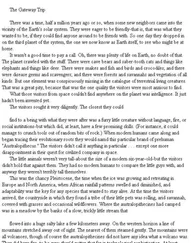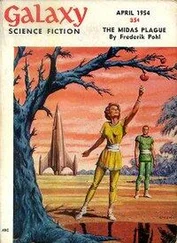Pohl, Frederik - The Age of the Pussyfoot
Здесь есть возможность читать онлайн «Pohl, Frederik - The Age of the Pussyfoot» весь текст электронной книги совершенно бесплатно (целиком полную версию без сокращений). В некоторых случаях можно слушать аудио, скачать через торрент в формате fb2 и присутствует краткое содержание. Жанр: Старинная литература, на английском языке. Описание произведения, (предисловие) а так же отзывы посетителей доступны на портале библиотеки ЛибКат.
- Название:The Age of the Pussyfoot
- Автор:
- Жанр:
- Год:неизвестен
- ISBN:нет данных
- Рейтинг книги:4 / 5. Голосов: 1
-
Избранное:Добавить в избранное
- Отзывы:
-
Ваша оценка:
- 80
- 1
- 2
- 3
- 4
- 5
The Age of the Pussyfoot: краткое содержание, описание и аннотация
Предлагаем к чтению аннотацию, описание, краткое содержание или предисловие (зависит от того, что написал сам автор книги «The Age of the Pussyfoot»). Если вы не нашли необходимую информацию о книге — напишите в комментариях, мы постараемся отыскать её.
The Age of the Pussyfoot — читать онлайн бесплатно полную книгу (весь текст) целиком
Ниже представлен текст книги, разбитый по страницам. Система сохранения места последней прочитанной страницы, позволяет с удобством читать онлайн бесплатно книгу «The Age of the Pussyfoot», без необходимости каждый раз заново искать на чём Вы остановились. Поставьте закладку, и сможете в любой момент перейти на страницу, на которой закончили чтение.
Интервал:
Закладка:
“If they’re so dangerous, why aren’t they in concentration camps?”
“Charles! You’re acting kamikaze again!”
“Or why isn’t there a law against working for them?”
She sighed and nibbled what looked like a candied orchid, regarding him with fond concern. “Oh, Charles. Human society is not merely a matter of law. You have to remember principle. There are certain standards of what is good and what is bad, and civilized people comply with them.”
Forrester grumbled, “Yes, I understand that. It’s good when anybody jumps on me. It’s bad when I try to do anything about it.”
“Kamikaze, Charles! I’m simply trying to point out to you that Taiko—for instance—would pay you at least as much as this filthy Sirian for a socially useful job—”
“Sweat Taiko!” shouted Forrester, making her laugh with his malaprop anger. “I’m going to do this by myself!”
So Adne left him there on friendly terms, but she left him nonetheless; an engagement in connection with her employment, she said, and Forrester did not know enough about her job to question it. He hadn’t found an opportunity to ask what her “crawling” date had been, nor did he see a chance to bring up her suggestion about picking a name. She volunteered nothing, and he was just as well pleased.
Besides, he wanted to talk more with the children.
With their help he was learning more about the Sirian than the Sirian would be able to learn about him. The kids frothed with information. It wasn’t difficult to master all the facts they had on tap, for there were not many real facts about Sirians to learn. All the hostages on Earth were of the same sex, for example, but there was a good deal of argument about what that sex was. Nor was their family structure at all clear. Whatever their relationships may have been on the planet from which they came, none of them had ever given any signs of being particularly depressed over being separated from their near and dear. Forrester took in the information grudgingly; he could not help thinking there should have been more of it. He said, “Do you mean to tell me that the only time we’ve ever seen them is this one time when we wiped out their exploring party?”
“Oh, no, Charles!” The boy was indulgent with him. “We long-range spied their home planet once, too. But that’s dangerous. Anyway, that’s what they say; so they stopped it. If it was up to me I would have kept it up.”
“And like in the chromosphere of Mira Ceti,” added the girl brightly.
“The what?”
The boy chortled. “Oh, yeah. That was a fun one! We had it on our class evaluation trip.”
“Sweat!” cried the girl excitedly. “Say! Maybe Forrester would like to go with us if we do it again. I’d like to!”
Forrester felt a sensation of committing himself to more than he liked. He said uncertainly, “Well, sure. But I don’t have much time right now. I mean, these are my working hours—”
“Oh, sweat, Charles,” said the boy impatiently, “it doesn’t take time. I mean, you don’t go anywhere in space. It’s a construct.”
“Only it was kind of real, too,” added the girl.
“But it’s all just tapes now,” explained the boy helpfully.
“Show him!” crowed the girl excitedly. “Mira Ceti! Please, Tunt, you promised!”
The boy shrugged, cocked an eye thoughtfully at Forrester, then leaned forward. He spoke into his junior joymaker and touched a button on his teaching desk.
At once the cluttered children’s room disappeared, and they were surrounded by a wall of hot swirling gray and incandescent orange. It cleared. . . .
And at once Forrester and the two children were seated in the bridge of a spaceship. The toys were gone, the furnishings replaced by bright metal instruments and flickering, whistling gauges. And outside crystal panels surged the devastating chromosphere of a sun.
Forrester shrank back instinctively from the heat before he realized that there was none. It was illusion. But it was perfect.
“By God!” he cried admiringly. “How does that work?”
“Sweat, I don’t know,” scoffed the boy. “That’s ninth-phase stuff. Ask your joymaker.”
“Well, machine? How about it?”
The calm voice of the joymaker replied at once. “The phenomenon you are currently inspecting, Man Forrester, is a photic projection on a vibratory curtain. An interference effect produces a virtual image on the surface of an optical sphere with the nexus of yourself and your companions as its geometric center. This particular construct is an edited and simplified reproduction of scansion of a Sirian exploration vessel in a stellar atmosphere, to wit—”
“That’s enough,” interrupted Forrester. “I liked the kid’s answer better.”
But the boy said tautly, “Knock it off, Charles. We’re starting! See, there’s this Sirian high-thermal scout vessel, and we’re about to run into it.”
A harsh male voice rasped, “Tractor ship Gimmel! Your wingmate has an engine dysfunction! Prepare to lock, grapple, and evacuate crew!”
“Are!” cried the boy. “Start search procedures, Tunt! Keep a watch, Charles!” His hands flashed over the keyboard—it had not been there a moment before, but it was operative; when he energized a circuit, their make-believe ship responded. He put it through a turn; the “virtual” sunship heeled sharply and sped through fountains of flaming gas.
Forrester could not repress his admiration at the perfection of the illusion. Everything was there, everything but the heat and the feeling of motion—and, gazing at the images around him, Forrester could almost feel the surge and shudder of their ship as it responded to the boy’s touch at the controls. Clearly, they were part of a squadron on some adventurous, unspecified mission. Forrester saw nothing that resembled a Sirian; he saw nothing at all, in fact, but the serpents and coils of gas through which they hurtled. But he was conscious of illusory vessels around them. A spatter of command signals came through the speaker as other “ships” talked back and forth. A panel showed their position in plan and elevation as they swam through the stripped-atom gases of Mira Ceti’s ocean of fire. Forrester ventured to say, “Uh, Tunt. What am I supposed to be doing again?”
“Just use your eyes!” the boy hissed, his attention riveted to the controls. “Don’t mix me up, man!” But his sister was shrieking, “I see it! I see it, Tunt! Look over there!”
“Oh, sweat,” he groaned in despair. “Will you ever learn to make a report?”
She gulped. “I mean, wingmate sighted, vector oh, seven, oh, I guess. Depression—um—not much.”
“Prepare to grapple!” roared the boy.
Through the incandescent swirl a fat slug of a ship appeared, vanished, and appeared again. It was black against the blinding brilliance of its surroundings. Black on its metal skin, black in its ports, black even at the tail where a rocket exhaust discharged dark gases into the brightness around them. The rocket cut off as a labored voice gasped through the speaker, “Hurry it up, Gimmel! We can’t hold out much longer!”
They jockeyed close to the stranded “ship,” buffeted this way and that by the force of the flaming gas. Forrester stared open-mouthed. There was the ship, derelict and helpless. And beyond it, swimming faintly toward them through the chromosphere, something that was bright even in this explosion of radiation, something that loomed enormous and fearsome. . . .
“Holy God,” he cried, “it’s a Sirian!”
And the whole picture shivered and winked away.
They were back in the children’s room. For a moment Forrester was almost blind; then his strained optic centers began to register again. He saw the view-walls, the furnishings, the children’s familiar faces. The expedition was over.
Читать дальшеИнтервал:
Закладка:
Похожие книги на «The Age of the Pussyfoot»
Представляем Вашему вниманию похожие книги на «The Age of the Pussyfoot» списком для выбора. Мы отобрали схожую по названию и смыслу литературу в надежде предоставить читателям больше вариантов отыскать новые, интересные, ещё непрочитанные произведения.
Обсуждение, отзывы о книге «The Age of the Pussyfoot» и просто собственные мнения читателей. Оставьте ваши комментарии, напишите, что Вы думаете о произведении, его смысле или главных героях. Укажите что конкретно понравилось, а что нет, и почему Вы так считаете.












